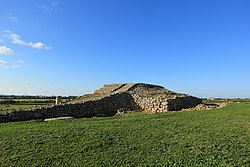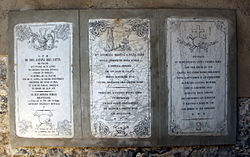Sardinians
Sardinians (Sardinian: Sardos or Sardus; Italian: [Sardi] Error: {{Lang}}: text has italic markup (help)) are the people native to the island of Sardinia, an autonomous region of Italy.
| Total population | |
|---|---|
| 1.5 million (est.) | |
| Languages | |
| Sardinian, Italian, Corsican, Catalan | |
| Religion | |
| Christianity | |
| Related ethnic groups | |
| Neolithic European farmers Corsicans, Spaniards and Italians |
Sardinians are noted for the distinct Nuragic civilization in ancient times. They are also known for the indigenous language many still speak, Sardinian. Sardinian is quite separate from Italian and said to be one of the languages, if not the language, keeping most archaic features of ancient Latin. Sardinians have long been active to fight for the official recognition of autonomy in Italy and the protection of their cultural and environmental heritage.
Sardinians Media
Depiction of the Sardus Pater Babai in a Roman coin (59 B.C.)
Fragment of pottery with human figures, Ozieri culture
Megalithic altar of Monte d'Accoddi, erected by the Pre-Nuragic Sardinians from the Ozieri and Abealzu-Filigosa culture.
In yellow are the territories occupied by Carthage, with the red dots being their most notable settlements.
View of Cagliari (Calaris) from the "Civitates orbis terrarum" (1572)
Diagram of longevity clues in the main Blue Zones
Historic cemetery of Ploaghe. In the tombstone to the left, dating back to the second half of the 19th century and written in Sardinian, some historical Sardinian given names are used (Antoni, Johanna Teresa, Franciscu). Such given names are however absent in the neighbouring tombstones written in Italian, which testifies to the ongoing process of language shift.









